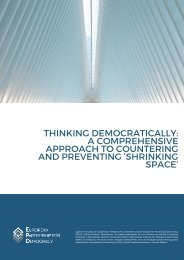Repression and resilience: Diagnosing closing space mid-pandemic
You also want an ePaper? Increase the reach of your titles
YUMPU automatically turns print PDFs into web optimized ePapers that Google loves.
REPRESSION AND RESILIENCE: DIAGNOSING CLOSING SPACE MID-PANDEMIC<br />
13<br />
Key features of<br />
democratic <strong>space</strong> during COVID-19<br />
In many ways, trends in democratic <strong>space</strong> during the<br />
p<strong>and</strong>emic were very similar to those we know from the<br />
past, <strong>and</strong> often reflected existing political dynamics.<br />
In many countries, political dynamics that preceded<br />
the p<strong>and</strong>emic - such as anti-democratic leadership<br />
in El Salvador, a fragmentation of political opposition<br />
in Kenya, or delays in the Colombian peace process -<br />
defined the political conditions for the management of<br />
the p<strong>and</strong>emic. In countries with elections such as Burundi<br />
<strong>and</strong> Ug<strong>and</strong>a, the year 2020 was characterised by the<br />
electoral process in the conditions set by the p<strong>and</strong>emic.<br />
In other countries, the p<strong>and</strong>emic was just one of multiple<br />
crises - such as the ongoing institutional crises in<br />
Venezuela <strong>and</strong> Guatemala, <strong>and</strong> the hurricanes affecting<br />
over 4 million people in Honduras.<br />
applauded by the population, calling for clear <strong>and</strong> strong<br />
leadership to manage the p<strong>and</strong>emic. In cases like Brazil<br />
where the government decided not to put up restrictions<br />
for protecting people’s health, people protested the<br />
lack of adequate protections. 22 Yet in other cases, the<br />
restrictions on democratic <strong>space</strong> were clearly politically<br />
motivated, rather than measures for the protection<br />
of people’s health. Executives then simply used the<br />
p<strong>and</strong>emic as an excuse to legitimise their centralised<br />
leadership. Regardless of the executive’s motivations,<br />
people’s support for restrictive measures was never<br />
universal, with large discrepancies in support between<br />
those with the luxury of home office <strong>and</strong> those who<br />
were economically dependent on free movement <strong>and</strong><br />
assembly.<br />
The p<strong>and</strong>emic measures generally aggravated <strong>and</strong><br />
accelerated ongoing trends in democratic <strong>space</strong>. The<br />
kinds of attacks on civic <strong>space</strong> identified by EPD <strong>and</strong><br />
NIMD in the previous round of case studies in Indonesia<br />
<strong>and</strong> Kenya were mirrored in the new case studies in<br />
these countries. The corruption problems identified in<br />
Honduras before the p<strong>and</strong>emic in the 2017 case study<br />
were similarly mirrored in the purchase of p<strong>and</strong>emic<br />
equipment in 2020.<br />
At the same time, the role played by the executive<br />
branch of government in the response to COVID-19<br />
opened up new possibilities for concentrating power <strong>and</strong><br />
restricting democratic <strong>space</strong>, often even with approval<br />
or lack of opposition from the public. As governments<br />
had to strike a balance between fundamental freedoms<br />
<strong>and</strong> public health, many governments restricted <strong>space</strong><br />
with the purpose of halting the spread of the p<strong>and</strong>emic<br />
<strong>and</strong> saving lives. Many such restrictive measures were<br />
Building on these nine case studies conducted over the<br />
course of July 2020 to December 2020, this section<br />
highlights 7 new or amplified trends in democratic <strong>space</strong><br />
directly related to p<strong>and</strong>emic measures.<br />
Increase in violent attacks on democracy<br />
defenders<br />
Across nearly all case studies, the period of the p<strong>and</strong>emic<br />
saw a major increase in violent attacks on human<br />
rights defenders, political activists, civil society staff<br />
<strong>and</strong> media workers. In Guatemala, as many reported<br />
cases of harassment of human rights defenders <strong>and</strong><br />
activists occurred in the first half of 2020 as in all of<br />
2019. In Colombia, 100 human rights defenders were<br />
murdered between January <strong>and</strong> May, as death squads<br />
exploited the lockdown to silence critical voices. El<br />
Salvador also saw a major increase in harassment of<br />
22 See for instance the protests in Brazil. Al Jazeera (2020): “Deny <strong>and</strong> Defy: Bolsanaro’s approach to the corona virus in Brazil”. Available here.

















